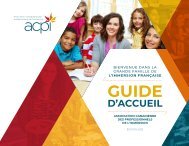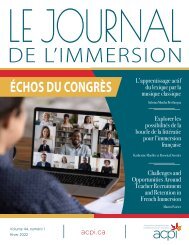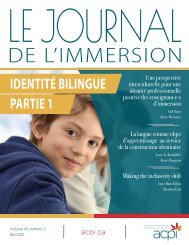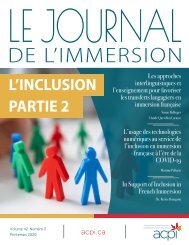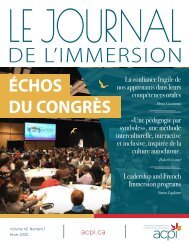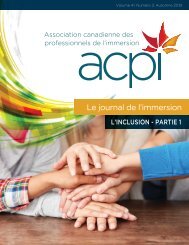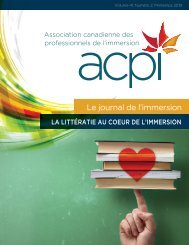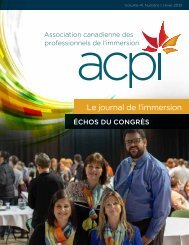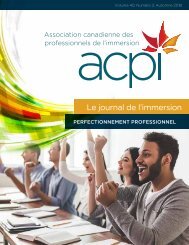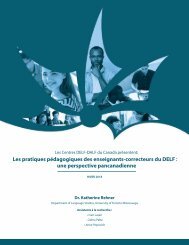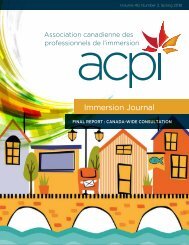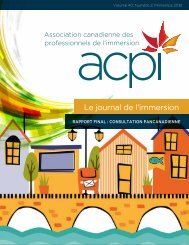You also want an ePaper? Increase the reach of your titles
YUMPU automatically turns print PDFs into web optimized ePapers that Google loves.
4. We recommend that the DELF Committee and the French Embassy commit to:<br />
• supporting opportunities for professional development relating to the CEFR and DELF;<br />
• promoting the findings of this report among Ministries of Education, Boards of Education, Universities, Faculties<br />
of Education, and other relevant bodies.<br />
In sum, this research has found that CEFR/DELF-related professional learning is having a powerful, positive impact on<br />
the reported practices of French teachers across the spectrum in ways that reflect the principles and spirit of the CEFR.<br />
These changes are well poised to further strengthen student proficiency and confidence in French and improve the<br />
effectiveness of French education in Canada.<br />
Ottawa (Ontario) K1P 5V5<br />
www.acpi.ca<br />
REFER<strong>EN</strong>CES<br />
• Canadian Ministers of Education Council. (2010). Working with the common European framework of reference<br />
for languages (CEFR) in the Canadian context. Guide for Policy-makers and Curriculum Designers. Ottawa, ON:<br />
www.cmec.ca/Programs/assessment/Documents/CEFR-canadian-context.pdf.<br />
• Council of Europe (2001). Common European Framework of Reference for Languages: Learning, Teaching and<br />
Assessment. Cambridge: Cambridge University Press.<br />
• Kristmanson, P., Lafargue, C., & Culligan, K. (2011). From action to insight: A professional learning community’s<br />
experiences with the European language portfolio. The Canadian Journal of Applied Linguistics, 14(2), 53-67.<br />
• Maldina, E. (2015). The Impact of the Common European Framework of Reference on Foreign Language<br />
Instruction: the case of sociolinguistic and pragmatic competence. (Master’s Thesis) University of Toronto.<br />
• Mison, S., & Jang, I.C. (2011). Canadian FSL teachers’ assessment practices and needs: Implications for the<br />
adoption of the CEFR in a Canadian context. Synergies Europe, 6, 99–108.<br />
• Piccardo, E. (2013). (Re)conceptualiser l’enseignement d’une langue seconde à l’aide d’outils d’évaluations :<br />
comment les enseignants canadiens perçoivent le CECR. The Canadian Modern Language Review, 69(4), 386-414.<br />
• Piccardo, E. (2014). From communicative to action-oriented: A research pathway. www.curriculum.org/projects/fsl.<br />
• <strong>Rehner</strong>, K. (2014). French as a second language (FSL) student proficiency and confidence pilot project 2013-2014:<br />
A report of findings. Toronto, ON: Ontario Ministry of Education and Curriculum Services Canada.<br />
• Vandergrift, L. (2015). The DELF in Canada: Perceptions of students, teachers, and parents. Canadian Modern<br />
Language Review, 71(1), 52-74.<br />
34 | The Classroom Practices of DELF Teacher-Correcteurs: A Pan-Canadian Perspective DELF Centres of Canada | 35



